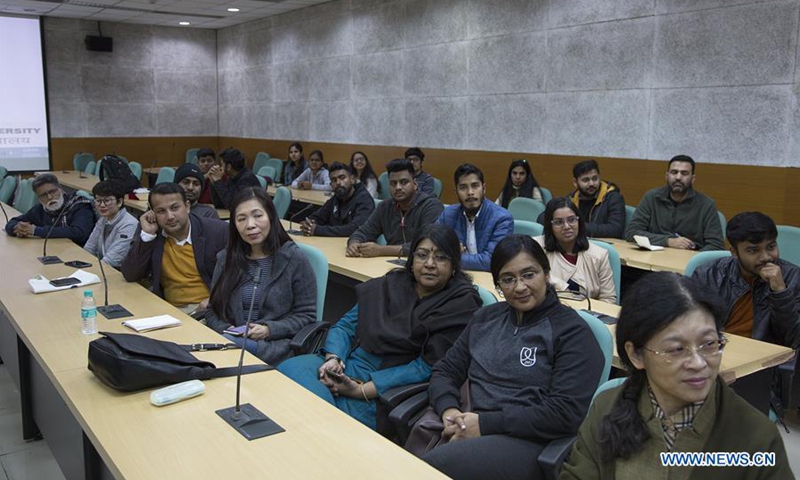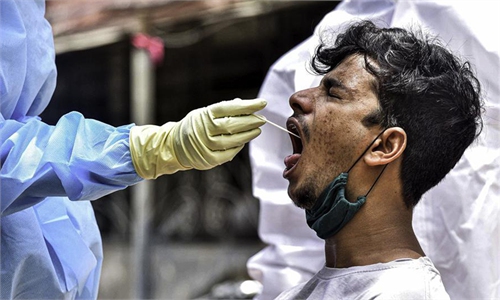
Delegates from China and India attend a seminar to discuss progress in the ongoing ambitious China-India translation project of classical and contemporary works at Jawaharlal Nehru University in New Delhi, India, Jan. 3, 2020. The year 2020 is the 70th anniversary of the establishment of the diplomatic relations between Beijing and New Delhi. Both countries have earmarked 70 different programs to celebrate the bond between them. (Xinhua/Javed Dar)
Four more chartered flights taking Chinese nationals back home will depart from India in the coming days, after the first flight left India on Monday, the Global Times has learned.
A New Delhi-based source familiar with the matter surnamed Hu told the Global Times on Monday that four chartered flights will depart from the Indian cities of Mumbai, Delhi and Kolkata and arrive in China in the coming days, after the first flight carrying hundreds of overseas Chinese left India on Monday morning.
With the total number of coronavirus cases jumping to over 257,000, it still has fewer infections than the US, Brazil, Russia and UK as of press time, according to data from Johns Hopkins University. With the death toll at about 7,000, the recovery rate in India remains close to 48%, as media reported that cases in the country have steadily risen, doubling every 17 days, making it one of the countries with the fastest rise in infections.
"People want to go back to China badly," Hu said.
According to Hu, there were about 3,000 Chinese people doing business or studying in big cities in India, and about half returned to China before the national lockdown on March 24.
India media reported that the government eased the lockdown on Monday, with the opening of restaurants, shopping malls and places of worship, while extending the lockdown in containment zones, or severely-hit regions, until June 30. International flights will also be suspended until June 30.
According to Reuters, the decision was made due to the economic pressure India is facing, despite the Indian's government admission that the lockdown has prevented an exponential rise in cases.
"I will definitely go out much less than before after the relaxing of the lockdown. It is unwise to lift restrictions when the outbreak is still deteriorating," said Hu, noting there were people found to be infected after going back to work in India.
On top of the surging number of cases, other disasters such as the worst locust invasion in 27 years and the biggest cyclonic storm over the Bay of Bengal in two decades that killed dozens of people, are making more Chinese determined to leave India.
The epidemic in India is far from reaching its peak, and there will be more Chinese leaving the country when international flights resume next month, Hu said, noting that the epidemic is spreading from crowded big cities to the countryside.
Chinese Embassy in India announced on May 25 that they will arrange for five flights run by China Southern Airlines, China Eastern Airlines and Air China to bring students, tourists and businessmen to five Chinese cities including Shanghai and Guangzhou. Close contacts of COVID-19 patients, people with symptoms such as fever and coughs in the last 14 days are not allowed to book tickets.
Although returnees are required to undergo testing paid for by themselves after arrival and tickets will cost between 8,000 ($1,129) and 13,000 yuan, Hu said the tickets are already hard to get after the embassy released the booking channel online.
Yang Zhanqiu, a Wuhan-based virologist, told the Global Times on Monday that China's national prevention and control mechanism and testing mechanisms are currently well established, ensuring that Chinese coming in from India will not cause a new wave of imported cases.
Although the difference in heat-resistance between the COVID-19 virus in India and China due to the different climates could impact the accuracy of testing, the 14-day isolation and medical observation will allow any emergency to be brought under control quickly.
According to China's current policy, returnees must undergo quarantine in designated sites and take a nucleic acid test and serum antibody test, said the embassy in its announcement.


